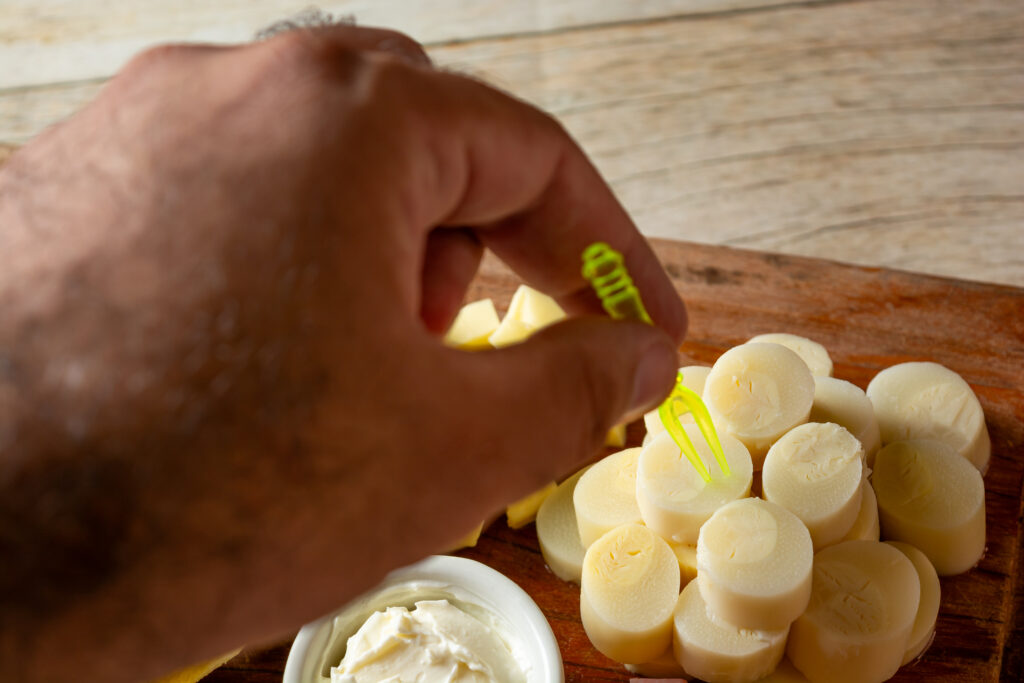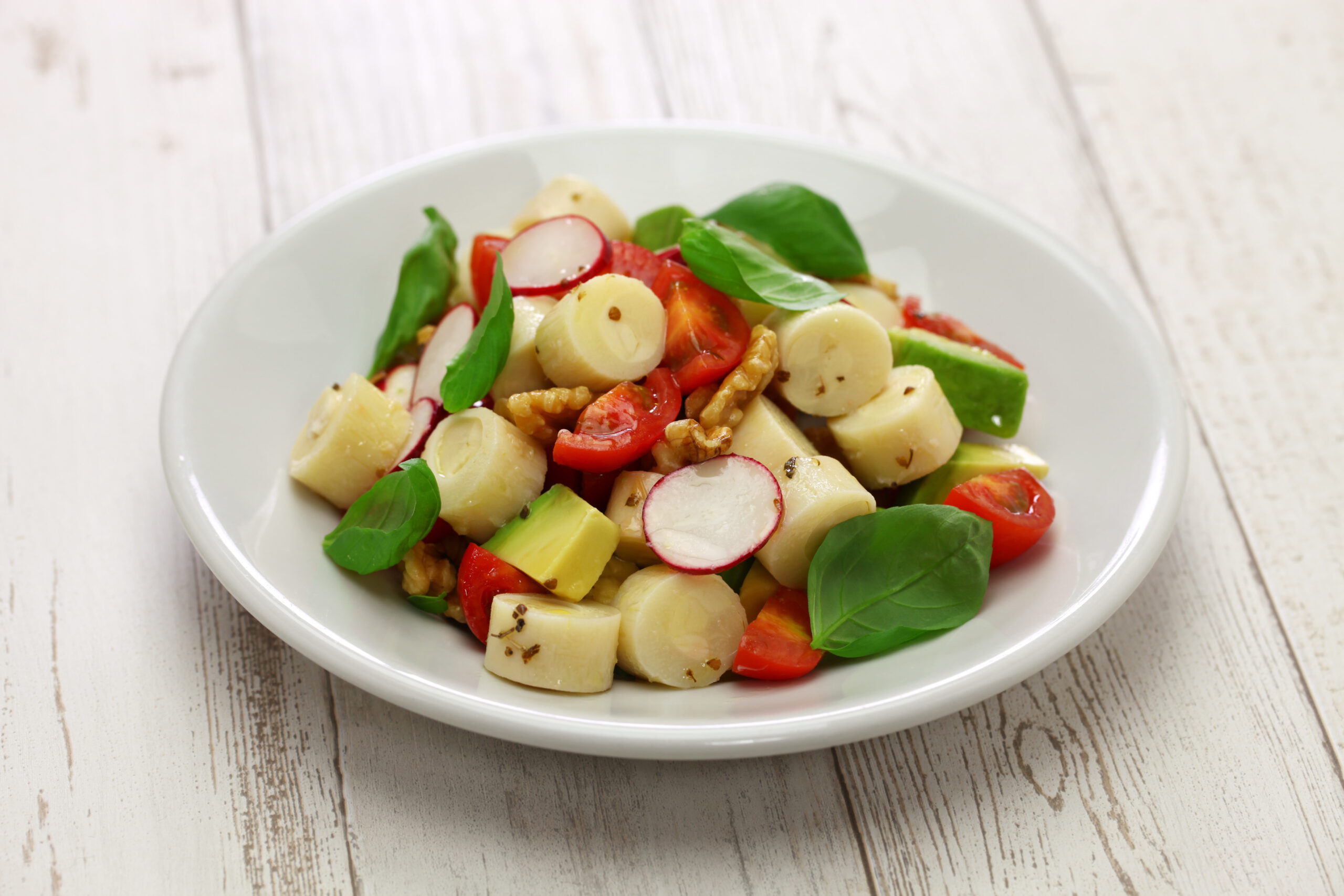Can Dogs Eat Hearts of Palm? Best Advice Revealed
Picture this: it’s a beautiful Sunday afternoon, and you decide to treat yourself to a delicious hearts of palm salad. As you sit down to enjoy your meal, your faithful companion, Max, looks up at you with those puppy eyes, begging for a taste. You wonder, can dogs eat hearts of palm?
Many dog owners find themselves in this situation, unsure if certain human foods are safe for their furry friends. Hearts of palm are a popular ingredient in salads and other dishes, but what about dogs? Are they safe and healthy for our canine companions? Let’s delve into the world of hearts of palm and their potential benefits and risks for dogs.
Key Takeaways:
- Hearts of palm are the tender inner portion of the trunk of palm trees, with a nutty taste and a slightly crunchy texture.
- While there are no reports of hearts of palm being toxic to dogs, it’s always best to consult with a veterinarian before introducing any new food to your dog’s diet.
- Hearts of palm can offer several potential benefits for dogs, such as being a good source of fiber and essential minerals like potassium, calcium, and magnesium.
- However, there are some potential risks to consider, including the possibility of allergic reactions and gastrointestinal issues.
- In conclusion, hearts of palm can be a safe and nutritious addition to a dog’s diet when fed in moderation, but it’s crucial to consider your dog’s specific needs and consult with a veterinarian.
What Are Hearts of Palm?

Hearts of palm are the tender inner portion of the trunk of palm trees. They have a light, nutty taste and a slightly crunchy texture, similar to artichokes. Hearts of palm can be used in a variety of dishes, including salads and stir-fries, and are known for their nutritional benefits.
These cylindrical-shaped vegetables are harvested from the core of specific species of palm trees, typically the Bactris gasipaes or Euterpe edulis. The heart of the palm tree is carefully harvested, usually from younger trees, to ensure its tenderness and delicate flavor.
Hearts of palm are popular in both traditional and contemporary cuisines, offering a unique addition to various culinary creations. Their delicate flavor and texture make them versatile, allowing them to be used in both raw and cooked applications.
In cooking, hearts of palm can be sliced and added to salads, mixed into pasta dishes, or incorporated into hearty stews. They can also be sautéed, grilled, or pickled for added flavor and versatility. Overall, hearts of palm bring a refreshing and distinctive element to any dish.
Hearts of Palm Nutritional Profile:
Aside from their pleasing taste and texture, hearts of palm are packed with essential nutrients. They are low in calories and fat, making them a great addition to a healthy diet.
- High in fiber: Hearts of palm provide a good amount of dietary fiber, which aids in digestion and promotes a feeling of fullness.
- Rich in vitamins: They are a good source of various vitamins, such as vitamin C, vitamin B6, and folate, which play important roles in supporting overall health.
- Mineral content: Hearts of palm contain essential minerals, including potassium, calcium, and magnesium, which are necessary for maintaining proper bodily functions.
Due to their nutritional composition, hearts of palm can contribute to a well-rounded and balanced diet.
Hearts of Palm in Cooking:
Hearts of palm can elevate the flavors and textures of various dishes, adding a unique touch to your culinary creations. Here are some popular ways to incorporate hearts of palm in your cooking:
- Salads: Hearts of palm can be a refreshing addition to salads, providing a pleasant crunch and mild flavor. Combine them with leafy greens, tomatoes, cucumbers, and a tangy dressing for a delightful salad.
- Stir-fries: Add sliced hearts of palm to stir-fries for a nutritious and textural element. They pair well with vegetables, tofu, and a savory sauce.
- Pasta dishes: Mix hearts of palm into pasta dishes to enhance both the taste and visual appeal. Their delicate flavor blends well with various pasta sauces.
- Dips and spreads: Puree hearts of palm to create a creamy dip or spread. Combine them with herbs, seasonings, and a touch of lemon juice for a delightful appetizer.
Overall, hearts of palm provide a unique and tasty addition to your culinary repertoire, offering a range of possibilities for both cooked and raw dishes.
Can Dogs Eat Hearts of Palm?
Hearts of palm are generally considered safe for dogs to consume. However, it’s important to consult with a veterinarian before adding this tropical ingredient to your dog’s diet. While there is limited information available about the effects of hearts of palm on canine health, it’s always best to seek professional advice to ensure the safety and well-being of your furry friend.
When introducing hearts of palm to your dog’s diet, it may be helpful to start with a small amount and observe their reaction. Just like introducing any new food, it’s important to be vigilant for any signs of discomfort or allergies. Your veterinarian can provide guidance on appropriate serving sizes and frequency for your dog.
While hearts of palm can offer potential nutritional benefits for dogs, such as being a good source of fiber, potassium, calcium, and magnesium, it’s crucial to maintain a balanced diet overall. Moderation is key when incorporating hearts of palm into your dog’s meals.
Remember, the health and safety of your dog should always come first. Consulting with a veterinarian will ensure that you make informed choices when it comes to your dog’s diet and overall well-being.

| Benefits | Risks |
|---|---|
| Good source of fiber | Potential allergic reactions |
| Contains potassium, calcium, and magnesium | Possible gastrointestinal issues from high fiber content |
| Low in calories and fat |
The Benefits and Risks of Feeding Hearts of Palm to Dogs
Hearts of palm can offer several potential benefits for dogs. They are a good source of fiber, which can help regulate digestion and maintain a healthy weight. Consuming fiber-rich foods like hearts of palm can support your dog’s overall gastrointestinal health and prevent constipation.
In addition to fiber, hearts of palm also contain essential minerals that are beneficial for your dog’s well-being. Potassium, calcium, and magnesium are all present in hearts of palm, contributing to healthy muscle function, strong bones, and electrolyte balance.
“Feeding hearts of palm to dogs in moderation can contribute to a balanced diet and provide them with important nutrients.”
Moreover, hearts of palm are low in calories and fat, which makes them a suitable choice for dogs who need to watch their weight or have specific dietary requirements. They can be a healthy alternative to other high-calorie treats.
However, it’s important to be aware of the potential risks associated with feeding hearts of palm to dogs. Allergic reactions can occur, although they are rare. If your dog has any known allergies or sensitivities, it’s recommended to consult with a veterinarian before introducing hearts of palm into their diet.
The high fiber content in hearts of palm can also pose a risk if consumed in excess. While fiber is beneficial for digestion, excessive amounts can cause gastrointestinal issues such as diarrhea or bloating in some dogs. Therefore, it’s crucial to feed hearts of palm in moderation and as part of a balanced diet to avoid any potential discomfort for your furry friend.
The Dos and Don’ts of Feeding Hearts of Palm to Dogs
- Do consult with a veterinarian before adding hearts of palm to your dog’s diet.
- Do start with small amounts of hearts of palm to observe your dog’s reaction.
- Don’t feed hearts of palm if your dog has known allergies or sensitivities.
- Don’t overfeed hearts of palm to avoid potential gastrointestinal issues.
In conclusion, hearts of palm can be beneficial for dogs when integrated into their diet in moderation. They provide fiber and essential minerals, making them a nutritious addition to their meals. However, it’s crucial to be mindful of potential risks and consult with a veterinarian to ensure hearts of palm are safe for your dog to consume.

Conclusion
In conclusion, hearts of palm can be a safe and nutritious addition to your dog’s diet when fed in moderation. They offer several potential benefits for your furry friend, including a good source of fiber, essential minerals like potassium, calcium, and magnesium, and low calorie content. Incorporating hearts of palm into your dog’s meals can help regulate digestion and promote a healthy weight.
However, it is crucial to be mindful of the potential risks associated with hearts of palm. Allergic reactions can occur, so it’s essential to monitor your dog’s response after introducing this ingredient. Additionally, the high fiber content in hearts of palm may cause gastrointestinal issues in some dogs. Always remember to introduce new foods gradually and consult with your veterinarian before making any dietary changes.
When it comes to your dog’s health, it’s best to seek professional advice. Veterinarians can provide personalized guidance based on your dog’s specific needs and health conditions. They can help ensure hearts of palm, or any other food, is suitable and safe for your canine companion.
FAQ
Can dogs eat hearts of palm?
While there are no reports of hearts of palm being toxic to dogs, it is always best to consult with a veterinarian before adding any new food to your dog’s diet.
What are hearts of palm?
Hearts of palm are the tender inner portion of the trunk of palm trees. They have a light, nutty taste and a slightly crunchy texture, similar to artichokes.
Are hearts of palm safe for dogs?
Hearts of palm are generally considered safe for dogs, but it is important to consult with a veterinarian before introducing them into your dog’s diet to ensure it is safe for them to consume.
What are the benefits of feeding hearts of palm to dogs?
Hearts of palm can offer several potential benefits for dogs. They are a good source of fiber, which can help regulate digestion and maintain a healthy weight. They also contain essential minerals such as potassium, calcium, and magnesium, and are low in calories and fat.
What are the risks of feeding hearts of palm to dogs?
The potential risks of feeding hearts of palm to dogs include the possibility of allergic reactions and the high fiber content potentially causing gastrointestinal issues. It is important to feed hearts of palm in moderation and as part of a balanced diet.
Subscribe to our weekly newsletter below and never miss the latest article.









